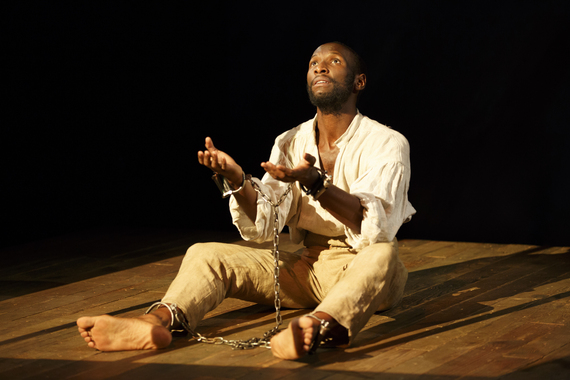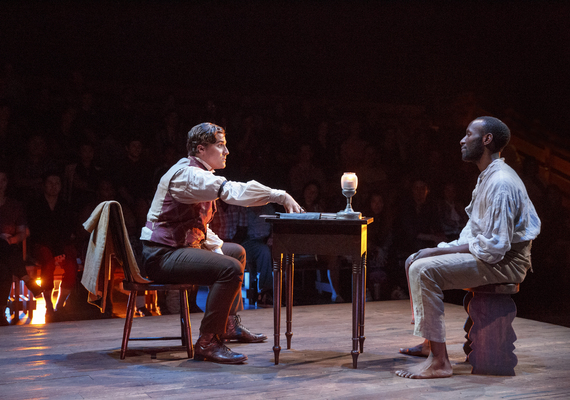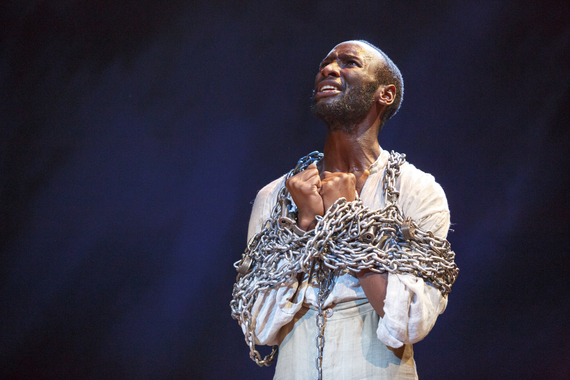Nat Turner in Jerusalem is one of those prison-cell-the-night-before-the execution plays. Jerusalem was a small town in Virginia, just north of the North Carolina border. The name was long since changed to Courtland, but the town remains known as the place where Nat Turner was executed on the morn of November 11, 1831.
Turner is one of those mostly forgotten people who can be said to have helped change the course of history. He joined with a group of fellow slaves to stage what is known as Nat Turner's Rebellion, in which they rode through the Virginia countryside for a couple of days killing any white people they came across (about 60 in all, as far as history can tell). While Turner's men were quickly caught--and the white locals went on a rampage, killing 200 or so slaves and free blacks--the leader managed to escape for two months until he was apprehended and hanged.
But that is neither here nor there. A week before his execution, Turner met with a rural lawyer named Thomas R. Gray. Gray ultimately published "The Confessions of Nat Turner," the veracity of which has been questioned. But it is the main source on Turner and his rebellion; without it, Turner might indeed have been forgotten altogether. Which brings us back to Nat Turner in Jerusalem. Nathan Alan Davis has conjured up ninety minutes-worth of that final evening's conversation, putting the audience in "the room where it happened" (as in the recently-coined popular phrase).
(If Turner is relatively unknown today, you can expect him to become instantly infamous next month as the main character in the forthcoming motion picture "The Birth of a Nation." Turner also had a spell of notoriety in 1967, compliments of William Styron's Pulitzer Prize-winning novel which was also titled "The Confessions of Nat Turner.")
Is this indeed a facsimile of what truly occurred? Or a fanciful recreation? It's impossible to say, of course; but playwrights have full license to tell their story the way they see it. Davis's version is not all that convincing or all that compelling. Phillip James Brannon (as the prisoner) and Rowan Vickers (as the lawyer and, in a few scenes, a prison guard) give strenuous performances as the only two actors onstage. Megan Sandberg-Zakian directs, using a square stage within a rectangle (and with the seating area at NYTW once again reconfigured, this time with bleachers of hard-bottomed benches with hardly-helpful cushions). She keeps the story moving, yes; but one can wonder at her device of overloud rock/gospel music between scenes; stagehands who come on and literally move the stage area from one side of the house to the other, and back; and Turner's prison-chains, which grow thicker and then thinner as the scenes progress.
Turner, here, seems an overly philosophical and ingratiating prisoner; in real life he was reported to be a self-educated, fire-and-brimstone preacher, but the character on stage seems more 21st century than 19th. That is the author's (and the director's and actor's) prerogative; if they feel they can make their points by making Turner a contemporary hero, so be it. Turner was never seen as a hero, mind you; but he was one of the earliest Americans to protest slavery in a manner so violent and fearful that it had impact in all twenty-four states.
Despite the potentially explosive subject matter, Nat Turner in Jerusalem turns out to be non-compelling. Let it be added that this is a case where the program note is more intriguing than the play itself. Lawyer Gray mentions several times that Turner indiscriminately killed children in his wanton murder spree. The helpful program note explains that "the dead included all of those who had ever claimed to own Turner, including his current legal owner, a ten-year-old boy named Putnam Moore."
Which sheds light on Nat Turner's Rebellion, for me, and begins to suggest some justification of the insurrection. That author's note, alas, is more forcefully striking than any of the play's dialogue.
.
Nathan Alan Davis's Nat Turner in Jerusalem opened September 26, 2016 and continues through October 16 at NYTW



